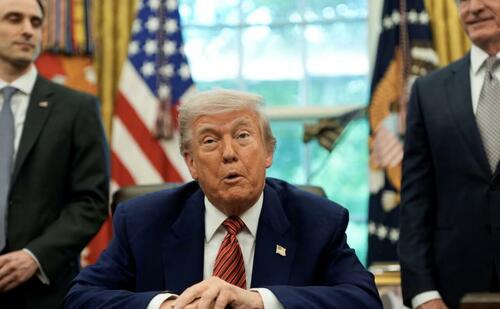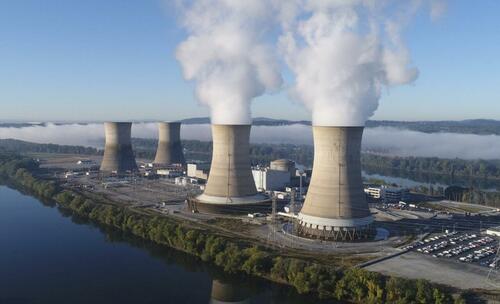President Donald Trump signed a series of executive orders designed to fast-track the development and deployment of advanced nuclear reactors on Friday culminating a dramatic policy shift aimed at revitalizing the U.S. nuclear energy sector.
🚨BREAKING: President Trump signs an Executive Order to revamp the Nuclear Regulatory Commission to cut reliance on foreign technology and strengthen the U.S. nuclear industry.
— Benny Johnson (@bennyjohnson) May 23, 2025
pic.twitter.com/m2gCGSggsz
Flanked in the Oval Office by Secretary of Defense Pete Hegseth and Interior Secretary Doug Burgum, Trump declared nuclear power “a hot industry” and praised it as “very safe and environmental.”
Burgum called it “a huge day for the nuclear industry,” and added, “Mark this day on your calendar. This is going to turn the clock back on over 50 years of over regulation of an industry.”
These orders aim to strip away what the administration describes as decades of regulatory overreach that have stifled innovation and stagnated the industry. “America’s greatness has always come from innovation,” Burgum said. “We led post-World War Two in all things nuclear. But then we’ve been stagnated. We’ve choked it with over regulation.”
The first of Trump’s executive orders directs the Department of Energy (DOE) to accelerate research and development, speed up reactor testing at national labs, and initiate a two-year pilot program for reactor construction.
A second order clears regulatory hurdles for the DOE and the Department of Defense (DOD) to build reactors on federal land — efforts that will bypass the Nuclear Regulatory Commission (NRC) entirely by using the agencies’ own regulatory authority.
“We’re going to do a lot of the small ones, and we’re going to do some of the big ones,” Trump said. “But yeah, very safe, safe and clean.”
The third order takes direct aim at the NRC itself. It mandates “a total and complete reform of NRC culture to reorient to ensure reactor safety and promoting the development and adoption of nuclear technology.” The order sets a new requirement that the commission rule on new license applications within 18 months, far faster than the current average of five years.
In support of this agenda, Hegseth underscored the national security implications, especially in powering AI infrastructure: “We’re including artificial intelligence in everything we do. If we don’t, we’re not fast enough, we’re not keeping up with adversaries. You need the energy to fuel it. Nuclear is a huge part of that, modular or otherwise. So we’re going to have the lights on and AI operating when others do not faster than everybody else because of nuclear capability.”
The fourth nuclear-focused order targets America’s uranium supply chain, aiming to “reinvigorate” the domestic nuclear industrial base. It calls for expanded uranium mining and enrichment, while also instructing Energy Secretary Scott Wright to evaluate policies for nuclear material recycling and reprocessing. A senior official explained, “That means America will start mining and enriching uranium and expanding domestic uranium conversion and enrichment capacity.” Nonproliferation and security considerations will guide those efforts.
Trump’s orders reflect a clear strategic intent: to restore the U.S. as a global leader in nuclear energy and science. Michael Kratsios, director of the White House Office of Science and Technology Policy, said the executive actions would “ensure continued American strength and global leadership in science and technology.”
He lamented the U.S. decline in nuclear progress, saying, “We decommissioned commercial reactors across the country, stepped back from nuclear R and D and abandoned hopes of nuclear energy, power and a bright future. America’s great innovators and entrepreneurs have run into brick walls when it comes to nuclear technologies.”
Kratsios declared that Trump is “telling the world that America will build again and the American nuclear renaissance can begin.”
With energy demands soaring due to AI and data center growth, industry giants like Microsoft, Oracle, Google, and Amazon are now investing in or exploring small modular reactors to power their operations. The administration sees this as a critical opportunity for the U.S. to lead again. “Nuclear energy is necessary to power the next generation technologies that secure our global industrial, digital, and economic dominance, achieve energy independence, and protect our national security,” a White House official said.
Source link



